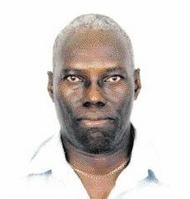
Cliff Williams Over the last few weeks, my colleague, Ainsley 'Jimmie' Walters and I have been looking at various issues affecting, in a negative way, the punters' enjoyment of the local version of the Sport of Kings.
Between us, we have examined issues such as what appears to be faulty timing of the races, inconsistent performance of horses and the attitude of the regulators to this matter and also bizarre eligibility race conditions leading to seriously flawed handicapping.
I will deal with the important issue of conditions for entries and handicapping at another time.
We both agree, and have pointed to incontrovertible evidence, both here and abroad, that the use of tongue-tie can induce improved performance yet it has been removed from the list of declarable equipment to be carried by horses in a race.
Personally, I have dealt with an unsatisfactory state of affairs where horses returning from extended layoffs can be allowed to race without any recent mandatory stipulated public workout.
Other deficiencies
Then, there is also the matter of trainers being allowed to submit entries with ineligible jockeys and having no further obligation finding alternatives before post time of the first race even though they have more than 48 hours.
This leaves punters to prepare pick-nine and or super-six bets with an incomplete programme.
I have pointed out that the official form book does not indicate in the performance record of horses where they compete in races confined to apprentice riders not allowed to use whips.
In the times posted for races over the straight course, there is no indication in the book, as was the case in the past, when there is a following wind.
There is also no indication of the date when horses change stables or are sold privately.
There is also an untenable situation when lessthan the regular 10 lines of past performance is shown, seemingly in an effort to save space.
Amazingly, none of the foregoing deficiencies need economic resources to implement and still nothing has happened, except in one instance, where there is now much more timely adherence to the saddling exercise and the parading of horses before post time.
Showing replays
For what it's worth, here is another suggestion - and I navely expect this to be implemented - commencing with this afternoon's race meet.
There is absolutely no need to slavishly follow the American format of showing the replays of the races after the dividends have been declared.
It is convenient and practical for the North American operators to do it this way, because, in the absence of any stewards' inquiry, using superior technology, the dividends there are available and displayed virtually before the jockeys dismount.
The posting of Caymanas dividends, even when there is no inquiry, can take as many as eight minutes and the replays take up another three to four minutes depending on the distance of the race.
Clearly, the showing of the replays after dividends constitutes a distraction occurring at the time when punters should be concen-trating on preparing their wagers for the following race.
Last Saturday, after the feature event with a post time of 3.05 p.m., the showing of the presentation ceremony and the replays was completed at 3.30 p.m.
With only the standard 30 or 35 minutes on average between races, it cannot be in the interest of the promoting company to continue to use time so unwisely.
As I have pointed out repeatedly, it is the service offered and punter confidence in the integrity and quality of the racing product that drives betting, without which the industry cannot exist.
There is no inherent reason why regulators, the Jamaica Racing Commission and the Betting Gaming & Lotteries Commission, as well as promoters Caymanas Track Limited, cannot commence immediately to correct these anomalies and put the local punters on par with those elsewhere in the world.

